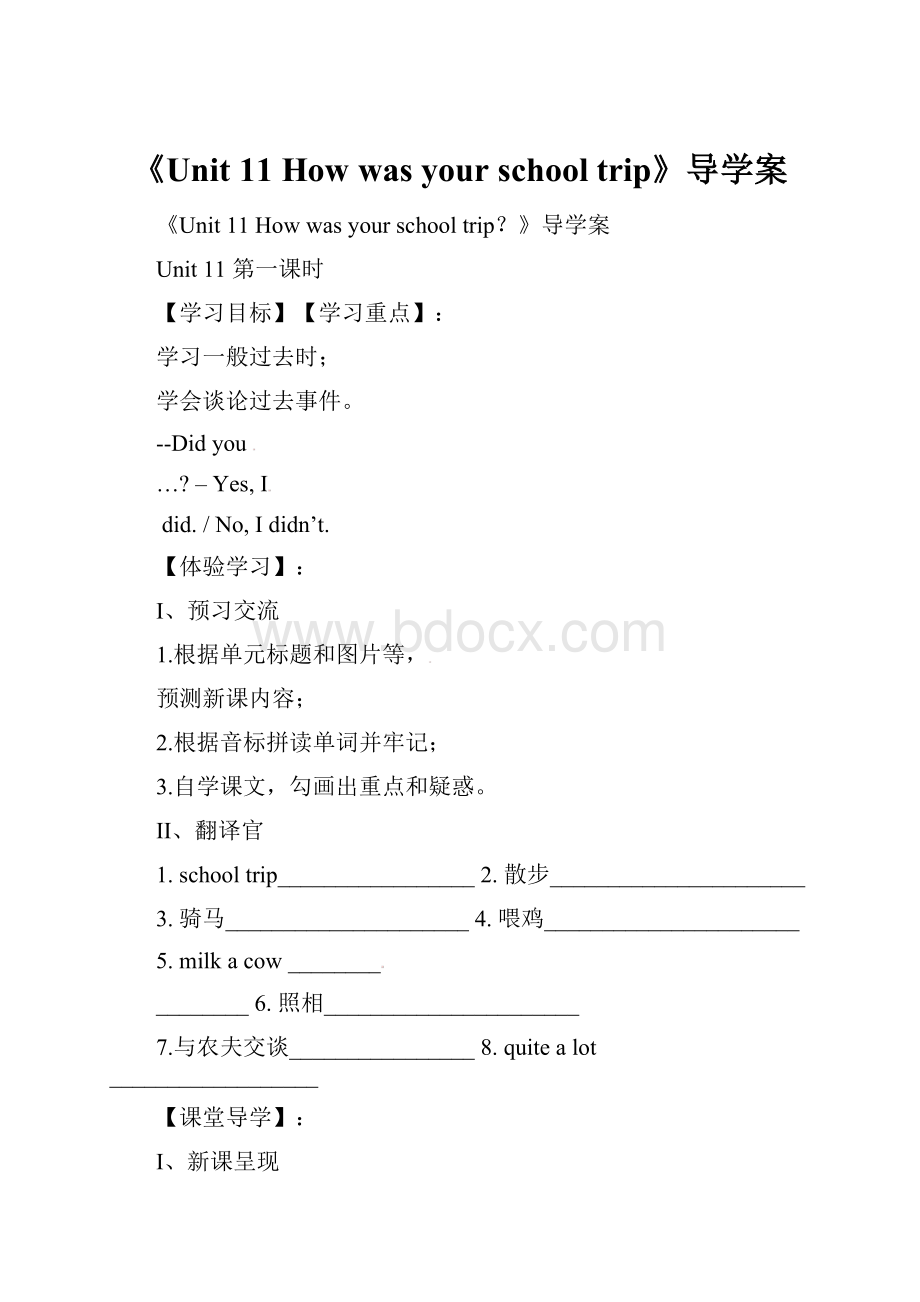《Unit 11 How was your school trip》导学案.docx
《《Unit 11 How was your school trip》导学案.docx》由会员分享,可在线阅读,更多相关《《Unit 11 How was your school trip》导学案.docx(22页珍藏版)》请在冰豆网上搜索。

《Unit11Howwasyourschooltrip》导学案
《Unit11Howwasyourschooltrip?
》导学案
Unit11第一课时
【学习目标】【学习重点】:
学习一般过去时;
学会谈论过去事件。
--Didyou
…?
–Yes,I
did./No,Ididn’t.
【体验学习】:
I、预习交流
1.根据单元标题和图片等,
预测新课内容;
2.根据音标拼读单词并牢记;
3.自学课文,勾画出重点和疑惑。
II、翻译官
1.schooltrip_________________2.散步______________________
3.骑马_____________________4.喂鸡______________________
5.milkacow________
________6.照相______________________
7.与农夫交谈________________8.quitealot__________________
【课堂导学】:
I、新课呈现
Step1Lead-in
Question1:
Whatdoyouoftendoonweekends?
Question2:
Whatdidyoudolastweekend?
Step2Presentation
1.Learnthenewwordsandphrasesin1a.
2.Finish1a,thenchecktheanswers.
3.Lookattheconversation,andlearnthedrills:
--Did
youseeanycows?
--Yes,Idid.Isawquitealot.
--Didyourideahorse?
--No,Ididn’t.But….
Step3Listening
Listenandfinish1b.Checktheanswers.
Step4Pairwork
Practicetheconversationin1c.Thenmakeyourownconversations.
II、合作交流
Groupwork:
分析总结一般过去时与一般现在时的区别,并练习造句。
Notes:
_________________________________________________________
______________________________________
___________________
【自主检测】:
I、时态大考验 (写出下列动词的过去式)
1.am____________2.is_______________3.are_______________
4.do____________5.go___________6.
see______________
7.feed___________8.ride____________9.say_______________
10.talk__________11.take_____________12.have______________
II、精挑细选
()1.--__________.
--Itwasprettygood.
A.Howdidyoudoit?
B.Howwasyourtrip?
C.Whatdidyoudo?
()2.________you________toLucy’sbirthdaypartyyesterday?
A.
Do,goB.Does,goC.Did,go
()3.CathyandRuth________theclassroomeveryday.
A.cleanB.cleansC.cleaned
()4.--_____
___youathomelastnight?
--Yes.Butmybrother_________notathome.
A.Were,wasB.Were,is
C.Are,was
【快乐链接】
Let’sChantTogether!
Amiswas,Iwasfree.Hewasbusy.
Arewere,arewere.Youwerehappy.Theywerebored.
Havehashad.Ihadaheadachebeforee
ight.
Saysaid,saysaid,Isaid"yes".Hesaid"no".
Dodoesdid,Ididmyhomeworkyesterdaymorning.
Gowent,gowent.Iwenttob
edlatelastnight.
Unit11第二课时
【学习目标】【学习重点】:
1.总结归纳SectionA部分语法重点;
2.并将所学知识学以致用。
【体验学习】:
预习交流
1.根据GrammarFocus,归纳SectionA部分语法重点;
2.自学课文,勾画出重点和疑惑。
【课堂导学】:
I、新课呈现
Step1GrammarFocus
1.Gi
veasummaryaboutit.
2.Tryto
reciteit.
Step2Presentation
1.Gothroughthelettersin3a.
2.Completethetwoletters,thenchecktheanswers.
3.Readtheletterstogether.
Step4Groupwork
Makeupastory.Eachstudentaddsasentence.eg:
Student1:
LastweekIvisitedmyaunt’shouse.
Student2:
Theweather
wasbeautiful.
Student3:
Wewentfishing.
Student4:
….
II、合作交流
1.Groupwork:
总结归纳SectionA部分语法重点
Notes:
________________________________________________
_________
__________________________________________________________
2.Groupwork:
动词过去式归类
规则动词:
____________________________________________________
(并列出规则)__________________________________________________
__________________________________________________
不规
则动词:
______________________________________________
【自主检测】:
完形填空
Mr.andMrs.
Taylorwereteach
ers.Theylivedinabig___1__.Lastyeartheywenttothecountrysidefortheirsummervacation.They___2__itverymuchbecause
itwasaquitecleanplace.
Onedaytheywentfora___3_inthemorningandsawanoldman.Hesatinthe___4
suninfrontof
hishouse.Mr.Taylor
wenttohimandasked,“Doyoulike5inthisquietplace?
”
Theoldmananswered,“Yes,I6
Mr.Taylorasked,“Whatarethe7thingsaboutit?
”
Theoldmananswered“Well,8hereknowseachother(互相)well.Theyoftencometoseeme,andIoftengotovisit9,too.Also,therearelotsofchildrenhere.”
Mr.Taylorsaid,“That’sinteresting.Well,10arethebadthings?
”
Theoldmanthoughtforashorttimeandsaid,“Well,thesamethings.”
()1.A.cityB.houseC.country
()2.A.learnedB.enjoyedC.played
()3.A.talkB.walkC.look
()4.A.coldB.cloudyC.warm
()5.A.readingB.livingC.sitting
()6.A.canB.amC.do
()7.A.goodB.cheapC.delicious
()8.A.nothing
B.everyoneC.noone
()9.A.himB.youC.them
()10.A.whatB.howC.who
【快乐链接】
一
般过去时顺口溜
动词一般过去时,表示过去发生的事;be用was或用were,have,has变had;
谓语动词过去式,过去时间作标志;一般动词加-ed,若是特殊得硬记。
否定句很简单,主语之后didn’t添;疑问句也不难,did放在主语前;
如果谓语之前有did,谓语动词需还原;动词若是was,
were,否定就把not添。
Unit11第三课时
【学习目标】【学习重点】:
继续进一步学习和谈论过去事件。
【体验学习】:
I、预习交流
1.根据
图片和对话等,预测新课内容;
2根据音标拼读单词并牢记;
3.自学课文,勾画出重点和疑惑。
II、翻译官
1.去动物园___________________2.爬山_____________
______
3.参观博物馆________________4.firestation______________
5.painting____________________6.画画__________________
【课堂导学】:
I、新课呈现
Step1Review&Lead-in
GrammarFocus
Step2Presentation
1.Learnandfinish1a.Thentrytorememberthephrase.
2.Game:
Quickactionaboutthephrases.eg:
A:
钓鱼.B:
gofishing
3.Makesentencesbyusingthephrasesin1aasfollowing.
--Iwenttothezoolastweekend.
--Heclimbedamountainwithfriendsyesterday.
Step3Listening
1.Gothroughthequestionsin1aandthechartin1cquickly.
2.Listenandanswerthequestionsin1b.
3.Listenagain.WhatdidJaneandTonydoontheirlastschooltrip?
CheckTonyorJane.Thenchecktheanswers.
Ste
p4Pairwork
Askandanswerquestionsaccordingto
theorderform.
II、合作交流
Groupwork:
总结归纳How…?
句型,如何回答?
请举例说明。
Notes:
_
________________________________________________________
_________________________________________________________
【自主检测】:
I、时态大考验 ((写出下列动词的过去式))
1.visit_______
_____2.climb_______________3.pick_______________
4.grow___________5.draw____________6.ask______________
_
7.study___________8.learn______________9.can_______________
10.buy___________11.teach______________12.eat_______________
II、快乐阅读
InEngland,peopledon’ttalktoeachotherwhentheytravel.Ifyougetonabus,orinatrain,youwillsometimesseepeoplesittingandlookingoutofthewindow.Otherpeoplewillbereadingbooksornewspapers.
WhenyoumeetEnglishpeople,theyoftenbeginaconversationbytalkingaboutt
heweather.SowhenyoumeetsomebodyinEngland,youcansay,“Niceweatherf
orthetimeoftheyear!
”
“Butitwasalittlecoldyesterday,”somebodymayanswe
r.
“Butitwillgetalittlewarmerlater,”youcansay.
Talklikethis,andtheEnglishwillthink,“Howfriendlyyouare!
”
()1.Englishpeopleoften___________onthebus.
A.talkalot
B.talktoeachother
C.readnewspapers
()2.WhenyoumeetanEnglishpeople,youcanbegintheconversationbytalkingaboutthe__________.
A.weatherB.timeC.food
()3.Accordingtothepassage,ifyoutalktoEnglishpeopleabouttheweather,theywillt
hinkyouare___________.
A.Englis
h.B.rightC.friendly
()4.Whichsentenceistrue?
A.Englishpeopleliketravelingbybus.
B.Englishpeopleareunfriendly.
C.Engl
ishpeopledon’ttalkmuchwhenthey’rebytrain.
Unit11第四课时
【学习目标】【学习重点】:
根据文章找寻关键信息,提高阅读能力。
【体验学习】:
I、预习交流
1.根据图片和文章标题等,预测新课内容;
2.根据音标拼读单词并牢记;
3.自学课文,勾画出重点和疑惑。
II、翻译官
1.exciting___________________2.可爱的_____________________
3.慢的快的______________4.昂贵的便宜的___________
5.
下棋____________________6.坐火车__________________
7.model
robot_______________
8.对…感兴趣_______________
9.总的说来__________________10.not…atall_________________
【课堂导学】:
I、新课呈现
Step1R
eview&Lead-in
1.Brainstormi
ng:
T:
Weoftenuseadjectivestodescribethings.Somedescribegoodthin
gsandsomedescribebadthings.Canyouthinkofsomeadjectives?
2.Finish2a.Puta√forgoodandan×forbad.
Step2Presentation
1.Readthediaryentriesabouttheschooltripandanswerthetwoquestions.
2.Readagainandcompletethechartin2b.
3.Groupwork:
readtheadagain,trytofindthekeypoints.
Thensay
themoutonebyone.eg:
<1>bytrain=takethe
train
<2>afterthat<3>….
Step3Consolidation
Readthekeypointsandthearticletogether.
II、合作交流
Groupwork:
分析总结阅读技巧,并尝试根据2c中的表格复述文章。
Notes:
_____________________________________________________
_____________________________________________________
【自主检测】:
完形填空June,15th
Todaywehad1excitingtrip.Myfather,mymotherandI2tosummercamp.Wewenttothemountains.First,we___3_tothefoot(脚)ofthemountain___4__bus.Inthemiddleofthemountain,therewasariver.Thewaterwasclean.Iwashedmyfacewiththe5.Itwaswarm.There6somefishesi
ntheriver.Andtherewerealotof7flowersinthemountain.At12o’clock,manypeoplegottogether,andtheywerevery8.Wemadeourlunchinthemountain.Thefoodwasvery9,andwelikeditverymuch.Afterlunch,wewentonourtrip.Atlast,wegottothetop(顶部)ofthemountain.Wewerevery10.Allinall,weenjoyedthetripverymuch.
()1.A.a
B.anC.the
()2.A.goB.goesC.went
()3.A.getB.gotC.gets
()4.A.byB.takeC.in
()5.A.waterB.food
C.trip
()6.A.isB.wereC.was
()7.A.uglyB.difficultC.beautiful
()8.A.friendlyB.boringC.expensive
()9.A.terribleB
.deliciousC.exciting
()10.A.happyB.unhappyC.lovely
【快乐链接】:
Diary
人们常说:
要真正学好英语,就要培养用英语思想的能力。
但是,要做到这一点是不容易的。
有一个简单易行的办法可以帮助我们练习用英语思想,那就是用英语写日记。
日记是十分自由的文体,不像作文,必须有正式的主题
,讲究文体。
日记是思想,是感情,是内心的一切。
实际上,用英语写日记是最有效的练习英语写作的形式。
它能够让你从各种生活细节及感受中学到最生活化、最地道的英语词语。
可以这么说:
如果你能流利地写出好的英语日记,你的英语就已经成功了一大半。
从某种意义上说,写英语日记又是最难的写作,因为它包罗万象,涉及到生活的各个方面,对词汇的要求特别高。
因此,在日常学习中,必须做一个“有心人”,准备一本笔记本,对一些英语的习惯表达法及时记录下来,以便在以后记日记的时候可以使用。
英语日记的写作格式:
日记的第一行,要写年、月、日与星期,然后要写明当天的气候状况,如果是游记,还要写明地点。
日记正文可以是叙事、描述、说明、议论等各种形式。
其实,由于日记是非常随便的,因此常与上述文体结合在一起使用。
日记内容取自生活,可长可短,有时无事可记,一两句也可以。
切忌今天记,明天不记,三